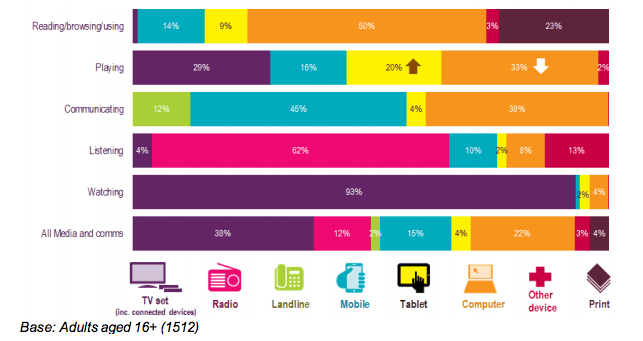38% of our interactions with all media and communications still occurs in front of a TV. But what else do we do with our devices?
Ofcom has just released their yearly Communications Market Report, where they analyse the UK communications sector.
The report sheds light on many aspects of how we use digital media and technology today, but one chart that stood out to me (not just because of the colours) was Fig 1.12 which showcases the proportion of time attributed to activity types, by device.

One thing to point out about this chart: is that it is an average across all age ranges. So these will vary within different age groups. As a reference point, Ofcom have researched behaviour for each of the sections in Fig 1.4.4 if you're curious to delve a little deeper.
The first point which stands out for me is the big share computer has when reading/browsing/using. With 50% it stands as by far and away the most popular device for reading the news, online shopping and researching etc. This throws up a bit of a question mark around Google's "Mobile First" thought process, however as the results from this research take into account the working day, I guess this explains the large percentage share. What was also interesting, is the amount of time spent on print, whether this is through newspapers or magazines.
The "communicating" section also brought up some interesting results. None-more so than the continued use of Landlines at 12%. Unsurprisingly it is usurped by Mobile and Computer, with 45% and 38% respectively.
The final nugget which came to my attention, was the landslide "victory" for TV for 'watching'. Naturally, you would expect it to be the preferred device for consuming watchable content, however, the margin of which it outperforms the rest of the devices it quite sizeable. The growing trend of streaming content on tablets, mobile and computers is very real, with numerous case studies to back this up. However, this research shows that people are not just watching digital TV, but they are hooking their devices up to the TV and consumer media through this. Whether it be via a Games Console with Netflix or Amazon TV attached to it, or a Google Chromecast, people obviously prefer watching content on bigger screens.








